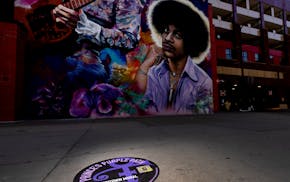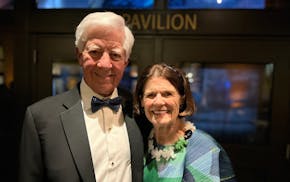Artist Sophie Calle is something of a sleuth. The French conceptual artist, who works primarily in photography, writing and video, is fascinated with the lives of others. However, she also hyper-fixates on her own life, embellishing narratives, offering insight into her intimate life and exposing details that a person normally would share only with a trusted friend.
This might sound like the selfie-focused social media world we live in, but Calle has been doing this sort of work since the late 1970s. Walker Art Center Chief Curator Henriette Huldisch made that connection and decided to bring Calle to Minneapolis. The exhibition, titled "Overshare," suggests that Calle's work, specifically her work that offers strangers a peek into her personal life, predicted the rise of social media long before any of us had smartphones.
The exhibition includes some of her classic early works that put her on the map, such as "The Sleepers," 1979, in which she, with consent, photographed people sleeping in her bed, and "The Hotel," 1981, for which she worked as a chambermaid at a hotel in Venice, examining the lives of hotel guests through their objects. The show also includes newer works, such as homages to her parents who passed away, and "Voir La Mer," 2011, for which she traveled to Istanbul to film and photograph Turkish migrant workers and their families as soon as they saw the sea for the first time.
Her projects touch on topics such as public-private boundaries, voyeurism and surveillance, and more specifically offer insight into the emotional vulnerability of the human experience.
The Minnesota Star Tribune talked with Huldisch to learn more about her interest in Calle and a little about the Hamburg, Germany-born, Minneapolis-based Huldisch. This interview has been edited for clarity.
Q: What about Sophie Calle's work moved you?
A: I have long been an admirer of her work. I think when I saw her at the Venice Biennale in 2007, when she represented France, I saw one of her most famous works called "Take Care of Yourself" [in the piece, Calle received an email telling her it was over, and the email ends with "Take care of yourself." In response, Calle asked 107 women to analyze, comment on, dance it, sing that email, help her understand]. I thought it was so fierce and so brave and funny and over the top and poignant.
Q: The name of the survey is "Overshare," which references the idea that people share too much and too often about themselves on social media. Was that intentional?
A: I think she's, in a way, the original oversharer. There's so much in her work that I feel is so prescient about a certain mode of self-performance and just like sharing and embellishing selves in a social media landscape, or modes in which reality TV developed earlier.
Q: How would you characterize her work, since she does photography and performance, but also writes?
A: There are a number of ways she is so fascinating and how people can relate to her work. One is that she engages with themes that everybody experiences in some way. Everybody gets their heart broken, everybody loses their parents. We've all snooped around on somebody else's life online. And we also kind of get drawn into her scenarios, and so our own voyeurism gets really activated. It's not only her. It is like prying into the lives of others and kind of becoming her accomplice in that a little bit. So I think it gets thrown back on the visitor also.
Q: There's something off-putting about the word "overshare" that makes me think you're being a bit tongue-in-cheek with the title of the show?
A: One of the points I'm making about this whole notion of oversharing — which is a word that is most often used pejoratively and usually about women's writing — is that this is actually a strategy that is very clearly honed, and she's in complete control about the extent of what she's disclosing when she's not disclosing. The title "Overshare" is a bit of a strategic conceit and a provocation in that sense. Like, yes, Sophie Calle very much controls the narrative.
Q: Do you feel like there is something parasocial about her work? Like you start to feel like you know Calle?
A: People think they know her through the work they encounter, through the images on the wall.
Throughout history, people have had really intense, remote relationships. Just think about love letters and stuff like that. But one of the things is that people have these relationships with people that they have never met and are very unlikely to meet. You can be completely infatuated with somebody that you've only encountered on social media, and you can kind of feel you actually know something about them and their lives.
4 Sophie Calle artworks to see
Section 1: The Spy. Be sure to see "The Hotel," 1981, a photo project and a "very iconic work," Huldisch said. Calle was hired as a chambermaid at a hotel in Venice for three weeks. She examined and documented hotel guests who stayed in the rooms, voyeuristically imagining the lives of these total strangers.
Section 2: The Protagonist. "No Sex Last Night," 1992, a short film collaboration with Greg Shephard, her partner at the time and now ex-husband. The film charts a road trip across the country during which their relationship nearly falls apart. Huldisch calls this "a key work in the exhibition."
Section 3: The End. Check out "North Pole," 2009. This work is an homage to Calle's mother, who always wanted to see the North Pole. Calle traveled there, burying her mother's portrait and jewels on the shore of a glacier, metaphorically taking her there.
Section 4: The Beginning. In Calle's project "The Hunt," she found dating ads from "Le Chasseur français" between 1895-2019, highlighting the qualities that men want in women and women want in men, and paired them with unrelated photos.
'Sophie Calle: Overshare'
When: Oct. 26–Jan. 26
Where: Walker Art Center, 725 Vineland Place, Mpls.
Cost: $2-$18, free Thu. 5-9 p.m. & first Sat. of the month
Hours: 10 a.m.-5 p.m. Wed., Fri.-Sun., 10 a.m.-9 p.m. Thu.
Info: walkerart.org or 612-375-7600

Minneapolis native Evren Ozel advances to finals of Van Cliburn International Piano Competition

How many of Minneapolis' new 'Purple Path' sidewalk signs for Prince fans can you find?
![Pepe Willie stood for a portrait outside the Capri Theater, which is undergoing a major renovation, in Minneapolis. ] Shari L. Gross • shari.gross@s](https://arc.stimg.co/startribunemedia/4TPIVGPZLESDCIL3ZJ4J4T4ZDU.jpg?h=91&w=145&fit=crop&bg=999&crop=faces)
Pepé Willie, mentor to Prince and Morris Day, dies at 76

Your ultimate guide to eating and drinking in downtown St. Paul

